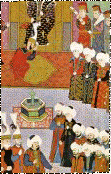| |

|
|

 |
6
OF 8 |
 |
 The
war went very badly for the Ottomans, and by 1878 they had to sue
for peace. Under the peace treaty, the Ottomans had to free all
the Balkan provinces, including Bosnia, Herzegovina, and Bulgaria.
Russia also took substantial amounts of Ottoman territory as "payment"
for the war. The Ottomans fell out of the picture, but the Russian
victory produced a European crisis over the expansion of Russia.
That, however, is not our concern. The
war went very badly for the Ottomans, and by 1878 they had to sue
for peace. Under the peace treaty, the Ottomans had to free all
the Balkan provinces, including Bosnia, Herzegovina, and Bulgaria.
Russia also took substantial amounts of Ottoman territory as "payment"
for the war. The Ottomans fell out of the picture, but the Russian
victory produced a European crisis over the expansion of Russia.
That, however, is not our concern.
War resumed between Russia and the Ottoman Empire
in 1877. Russia opened hostilities in response to Ottoman suppression
of uprisings in Bulgaria and to the threat posed to Serbia by Ottoman
forces. The Russian army had driven through Bulgaria and reached
as far as Edirne when the Porte acceded to the terms imposed by
a new agreement, the Treaty of San Stefano. The treaty reduced Ottoman
holdings in Europe to eastern Thrace and created a large, independent
Bulgarian state under Russian protection.
 Refusing
to accept the dominant position of Russia in the Balkans, the other
European powers called the Congress of Berlin in 1878. At this conclave,
the Europeans agreed to a much smaller autonomous Bulgarian state
under nominal Ottoman suzerainty. Serbia and Romania were recognized
as fully independent states, and the Ottoman provinces of Bosnia
and Herzegovina were placed under Austrian administration. Cyprus,
although remaining technically part of the Ottoman Empire, became
a British protectorate. For all its wartime exertions, Russia received
only minor territorial concessions in Bessarabia and the Caucasus.
In the course of the nineteenth century, France seized Algeria and
Tunisia, while Britain began its occupation of Egypt in 1882. In
all these cases, the occupied territories formerly had belonged
to the Ottoman Empire. Refusing
to accept the dominant position of Russia in the Balkans, the other
European powers called the Congress of Berlin in 1878. At this conclave,
the Europeans agreed to a much smaller autonomous Bulgarian state
under nominal Ottoman suzerainty. Serbia and Romania were recognized
as fully independent states, and the Ottoman provinces of Bosnia
and Herzegovina were placed under Austrian administration. Cyprus,
although remaining technically part of the Ottoman Empire, became
a British protectorate. For all its wartime exertions, Russia received
only minor territorial concessions in Bessarabia and the Caucasus.
In the course of the nineteenth century, France seized Algeria and
Tunisia, while Britain began its occupation of Egypt in 1882. In
all these cases, the occupied territories formerly had belonged
to the Ottoman Empire.
 |
6
OF 8 |
 |
|
|


